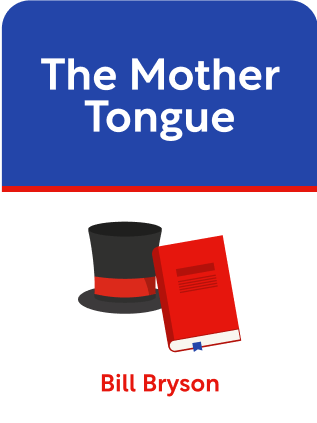

This article is an excerpt from the Shortform book guide to "The Mother Tongue" by Bill Bryson. Shortform has the world's best summaries and analyses of books you should be reading.
Like this article? Sign up for a free trial here .
What are the characteristics of the English language that made it easier for people all over the globe to adopt and spread it? What quirks and features of English make it unique?
In its development and evolution over time, the English language proved to be remarkably flexible and adaptable. These characteristics gave English a versatility that would later be a major asset as it spread to nearly all corners of the globe. Interestingly, these same characteristics of flexibility and adaptability can sometimes bedevil both native and non-native speakers of English.
In this post, we’ll explore some unique and defining characteristics of English that can sometimes lead to real confusion.
The Confounding Characteristics of the English Language
One of the main characteristics of the English language is its flexibility. But for all the benefits of being a flexible and adaptable language, English can sometimes be too flexible. Even simple words like set or fine can baffle speakers of other languages with their multiple meanings and contexts. Linguistic phenomena like polysemy—different meanings for a single word—are common (and confounding) characteristics of English. The language is also notorious for contronyms, words that appear the same but have multiple meanings that are the exact opposite—for example, sanction can mean either to approve or to censure; clip can mean either to bind or to detach.
Moreover, this same versatility can make English rules of grammar seem maddeningly arbitrary to non-native speakers. The subtle complexities of English can also bedevil even the most well-versed speakers. Even as ubiquitous a word as what has far more meanings than you’d think—it takes the OED a full five pages to define it.
Beyond grammar, English spellings often bedevil non-native speakers, as well as those who’ve spoken the language their whole lives. As we covered in the last chapter, pronunciation and spelling are frequently divergent. There are approximately 200 different ways of spelling all the different sounds in English. For example, the sh sound can be spelled sh as in mash; ti as in ration; or ss as in session. The f sound, meanwhile can be spelled f as half or gh as in enough.
Parts of Speech
Another complication of English arising from its versatility is the variability of the parts of speech themselves. In English, the parts of speech are quite loose and interchangeable. Unlike those languages whose grammatical structures derived more from Latin, English mostly lacks hard and fast rules governing tense, split infinitives, or any number of thorny grammatical or syntactic issues. For example, many words serve as both verbs and nouns. You can take a drive (noun) or drive a car (verb); you can go to a dance (noun) or you can dance to the beat (verb). The “rules” governing which words are which parts of speech are largely arbitrary. They are what they are because of custom and historical usage, not because of any universally applied and immutable set of principles.
Even the definition of what constitutes a sentence is fuzzy. Nominally, a sentence has both a subject and a predicate clause, but even these most basic rules break down in common usage. Even though they don’t have both a subject and predicate, single- word questions or exclamations like “How?” or “What!” can be considered sentences because of the implied existence of unwritten or unspoken words.
Some of the chaotic structure of English is due to the fact that early grammarians sought to impose Latin rules on Old English—a West Germanic language whose structure bore little relation to Latin. As the language of the Roman Empire and of the Catholic Church, Latin reigned supreme for medieval scholars; for centuries, nearly all literary and scientific works were written in the language. Even texts about English grammar were, incredibly, written in Latin.
The Variety of English Sounds
Another way we can see the versatility of English is with its great variety of sounds. The most common sound in the English language is the schwa. You may not have ever heard this term before, but you use it all the time. It’s the i sound in animal or the first a in alone. It corresponds roughly to an “uh”sound. And all five vowels in English can produce this sound.
Despite the omnipresence of this one sound, the English language is rich with varied pronunciation, filled with words spelled differently than how they are pronounced. We see this in word pairs that have similar spellings, but wildly different pronunciations—five and give; wear and hear; and doll and roll, to name just a few. All 26 letters of our alphabet are capable of having different pronunciations depending on the word in which they’re used.
Linguists have debated just how many different sounds are present in English. The figures vary depending on how one defines a unique sound. One study has found 90 separate sounds for just the letter t, but, regardless of the precise number, English is vastly richer in the variety of its sounds than other widely spoken languages (the whole Italian language, for example, has only 27 sounds).
Slurring
One of the most interesting ways for us to observe the evolution of the spoken language is with slurring—the addition, subtraction, or substitution of letters in spoken English that aren’t reflected in the spelling. For example, we say gramfather instead of grandfather, sumpthing instead of something, and glantz instead of glance.
Linguists believe that slurring arose from the fact that we can hear language much more quickly than we can speak it. This disparity in our processing speeds accounts for the common phenomenon of not being able to get words out, even when you have them formed in your mind (or your mind’s eye, to borrow from Shakespeare). It also gives rise to slurring, as we rush to articulate the words that we’ve already articulated in our minds. The general trend is one of subtraction, losing letters and syllables over time and letting pronunciations become looser and more casual. This is a phenomenon common to most languages as they evolve over time.
English speakers cut off the beginning, middle, and end of words. Speakers of British and American English might do this in different ways (sometimes rendering their speech mutually unintelligible), but the phenomenon exists on both sides of the Atlantic. Interestingly, the words that tend to be slurred the most are local and familiar place-names. The pronunciation of English places like Gloucestershire, Worcester, and Leicester (pronounced “Gloster,” “Wooster,” and “Lester,” respectively) can baffle outsiders, but so does the way Marylanders refer to their state’s largest city (“Balamer” instead of “Baltimore”).
Local Dialects of Great Britain
Our discussion of the slurring of place-names by locals brings us to another demonstration of the remarkable malleability of English—regional dialect and pronunciation. There is an astonishing variety of dialect within England alone (let alone Wales, Scotland, and Ireland). The linguist Simeon Potter has observed that there is more difference in speech between two points 100 miles distant from each other in England than there is in the whole of North America (we’ll go into greater detail on American speech patterns, as well as those in the broader English-speaking world, in the next chapter).
Harold Orton’s Linguistic Atlas of England demonstrated that even small areas of the country show great variation in their words for common items. Three neighboring villages in Berkshire each had a different word for a jacket—it was either a greatcoat, a topcoat, or an overcoat.
Unexplained enclaves of one region’s dialect mysteriously appear in another region. These dialects can be identified with great precision—Londoners are able to tell which side of the Thames a speaker comes from by hearing her dialect, while the people of Yorkshire can pinpoint someone’s home village with remarkable accuracy.
Socioeconomic Variation in Speech
In the 18th century, the English aristocracy began broadening the short a sound in words like bath, rather, and math to render their pronunciations bahth, rahther, and mahth. This is one of the characteristics that non-Britons instinctively identify with British English, although it’s of relatively recent vintage. This pronunciation forms a major dividing line between English and American speech, but also different socioeconomic groups within the UK—with Britons from wealthier backgrounds tending to broaden their a’s and working-class Britons retaining the short a.
The remnants of this pronunciation shift can still be seen even in the US. Nineteenth-century, upper-class Bostonians and New Yorkers likewise began broadening their vowels in imitation of the British aristocracy, while Americans further inland did not.
(Shortform note: Some older white Americans from wealthy Anglo-Saxon families still speak this way—it is the transatlantic or “Boston Brahmin” accent.)Indeed, social class can be as powerful an influence on English as geography and ethnicity. The American dialectologist William Labov observed in the 1930s that middle-class New Yorkers were far more likely to pronounce the r sound in words like door, car, and more than were their fellow working-class New Yorkers (the variability in the pronunciation of r sounds is known as rhoticity). The quintessential New York accent was clearly closely tied up with social class and income level. Pronouncing one’s r sounds was an indicator of higher social status.

———End of Preview———
Like what you just read? Read the rest of the world's best book summary and analysis of Bill Bryson's "The Mother Tongue" at Shortform .
Here's what you'll find in our full The Mother Tongue summary :
- How English became a global language
- How the invention of the printing press led to standardization of written English
- Why English dictionaries are the most comprehensive found in any language






